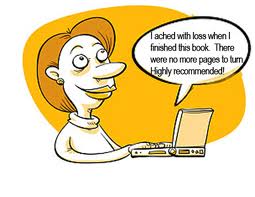How I Earn A Living As An Indie Author: I Do It My Way
In a presentation hailed as "inspirational" at a recent Edinburgh publishing conference, self-published writer Linda Gillard described how going indie…
In a presentation hailed as "inspirational" at a recent Edinburgh publishing conference, self-published writer Linda Gillard described how going indie…
Children's author Raymond Bean describes how he discovered and researched the perfect subject for books to engage reluctant young readers.…
Joanne Phillips, author of two novels and nearing the completion of her third, explains how to recruit and use beta…
How much of what a novelist writes is autobiographical? Conversely, if a non-fiction writer changes the names and circumstantial detail…
So... It's almost November and writers across the world are stocking their fridges scribbling notes. Yes, it's NaNoWrMo time. Natalie Wright,…
Self publishing is at the cutting edge of the most interesting, radical and provocative writing that's happening right now. Dan…
Kelly McClymer counts the ways.
Writers, especially self-published writers, often feel like they need a time bodyguard. There are always other pesky things to do like raise children, make dinner, do laundry, work. When I first began to write, I dreamed of the day I'd get an advance big enough I could justify holing up in my office for a full day of uninterrupted writing time.
Despite a dozen published novels, that day never came. I chalked it up to my inability to snag that coveted seven figure advance, and kept on writing, working, cooking, and cleaning (well…talking about cleaning, at least).
Guest Post by By Catherine Czerkawska
If I were to define midlist, I suppose it would be that huge, fertile, centre ground of well-written fiction which doesn’t slot neatly into any particular genre. It might be written by authors who like to experiment with crossing the boundaries and don’t see why they should always have to change their names to do so, especially when the ‘voice’ remains much the same.
I write historical and contemporary fiction, but the style is undoubtedly mine. Midlist readers are often, but by no means exclusively, female, often middle aged or older. They seem to be voracious readers.
The midlist used to be the seed bed from which the occasional (almost always unpredictable) blockbuster would spring. Screenwriter William Goldman’s much quoted dictum that ‘nobody knows anything’ applies just as much to fiction as to film. If the publisher got lucky, it might be an author's first or second book that made the breakthrough. More frequently it would be their fifth, sixth or seventh book. And if a book did become a bestseller or spawn a number of sequels, some of those profits would be ploughed back into nurturing other seedlings. Broadly speaking, that’s how it used to be, before the big corporations ate the smaller companies and changed the whole ethos of publishing in the process.
If your book were a delicious pie, distributors would be the ones who put it in the hands of the supermarkets.
It's a very simple analogy, but it rings true. Distribution is the supply link between our printers and the bookstores, and without it, our books would simply never reach our readers' hands. That's a painful vision. And to me, so is keeping a veritable mountain of books in your garage, shipping one at a time, staring at the big hole in your bank account.
No, thank you, I want a different road.
With the advent of the digital revolution came Print on Demand, and with it came distribution relationships. Now, POD companies have forged relationships with the wholesaler distributors to allow us indies access to
Part One of A Five-Part Week Series: "Which Distributor". A Guest Post by Giacomo Giammatteo. All this week on the Alliance…
 GUEST POST: By Ben Cameron of Smith Publicity.
GUEST POST: By Ben Cameron of Smith Publicity.
For publicity purposes, there are essentially two kinds of blogs, those that are an offshoot of another form of media, such as a newspaper, magazine or radio show; and those that are independent stand-alones. Either way, they are usually written by a single individual or a small group and have a very personal feel to them.
Like people, blogs can be quirky, opinionated and prejudiced. You are off to a great start if you think if them as people – as funny as your Aunt Bessie or grumpy as your old Uncle Carl.
1) Blogs Are Not an Afterthought
When it comes to media, some rank contacts in order of ‘importance’, with television being the golden ticket and blogs being something you try once other
In an over-crowded marketplace, we assume it’s reviews that sell books and, predictably, it’s now possible to buy “honest reviews”. Could paid-for reviews be a good investment? Possibly, but I think we should be asking ourselves a different question—how do books find their readers? Or, to put it another way, what makes a book visible in the marketplace?